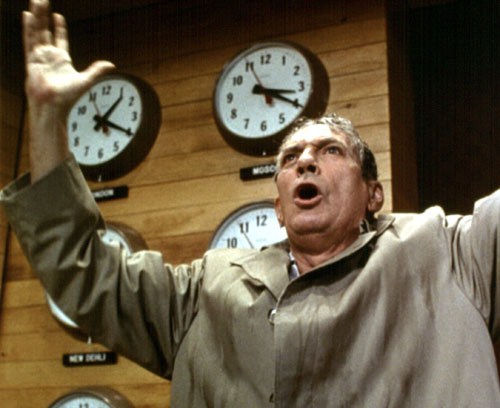Archive Review: Network (1976)
During parts of “Network,” you have to wonder if it’s a joke. The exploitation of a lunatic news anchor/prophet for financial gain with society just buying right in? Nuts. “Network” can definitely be viewed as an extreme and an unlikelihood, but that’s not to negate its powerful message and frightening ideas about media, consumerism and society in general.
Howard Beale, played by Peter Finch, the first posthumous Best Actor winner in Oscar history, (which adds an all-too-freaky layer to the film’s effectiveness), is about to retire from reading the news after ratings have bombed and he’s become disenchanted with the industry. On air, he promptly announces he will, in a week’s time, blow his brains out on the 7 o’clock news. What first becomes a PR nightmare for Beale’s station, UBS, evolves into a godsend when Beale goes on the air to apologize but delivers an impassioned speech rousing Americans out of their funk with his war cry: “I’m mad as hell and I’m not going to take this anymore!”
The dominoes begin to fall for various minds behind the network as a result of Beale’s sudden fame. The first is Diana (Faye Dunaway), a tough-as-nails producer from the programming side who crosses over into news with ideas of sensationalizing it. She creates “The Howard Beale Show” to capitalize on the media spotlight on Beale and seizes success on his coattails. Dunaway creates in many ways a terrifying portrait of a woman who seems part robot in that she’s only emotional when it comes to her singular purpose of making high-rating television. Her love affair with William Holden’s middle-aged Max Schumacher, a casualty of the network’s new direction, serves as allegory for old and new generations of media. Not exactly a believable relationship, but a fitting metaphor. A famous actor from Hollywood’s golden years, Holden fits in his role perfectly. He paints Max as a pitiable lost soul.
Other personalities include Robert Duvall as Frank, the in-between for UBS and the media company that owns them and Ned Beatty as Jensen, the man upstairs. Interestingly, “Network” has nothing to do with the journalism side of a newsroom but the business side. Paddy Chayefsky’s powerful script at its most fundamental level shows the dark side of the media, the business side, the side with a flagrant disregard for the ideals of journalism.
With a lot of dialogue, “Network” could not have been in better hands than those of Sidney Lumet. Lumet gets the most from his actors and adds an extra power to the many speeches throughout the film. Beatrice Straight barely appears in the film yet steals a scene in the middle. She plays Max’s wife, who goes off on him when he says he loves Diana. It’s a riveting scene with brilliant writing, but does Straight win Best Supporting Actress without the help of Lumet? “Network” contains a great deal of screaming and shouting yet little of it comes across as “noise” because he handles it so delicately.
The ensemble really carries “Network” on its bizarre ride. The likelihood of a news anchor going on TV and successfully convincing Americans to open their windows and shout that they’re “mad as hell” seems implausible, but the media has changed so much since 1976, more so than the changes the film depicts from the “good old years” of broadcast news up until that point. News anchors were the final word back then, but with the Internet, news and information can be found by the consumer. A sequel or maybe more like a follow-up to this film could be even more harrowing.
Chayefsky’s knock-out script suffers a tad from pacing, but few films are so packed with ideas worthy of day-long discussions on end. There’s so much to think about between the various relationships between the characters and what’s at stake for each of them and how blown out of proportion everything is. One of the many scenes that puts it all in perspective is during contract negotiations for a show Diana has put together that would follow a Communist liberation group on its terrorist escapades. There’s a huge argument between members of the group amidst the network employees and so the leader fires his gun to get them back on task to talk about subsidiary rights. It shows how ridiculous the whole show has become as everyone wants a piece.
“Network” serves as a cautionary tale on numerous levels. It starts as simple as news programming and grows as large as big business’ control on the world and its governments. Lying beneath the surface for all of it, however, lurks what can happen when personal interests guide important decision-making as it effects what the general public will see. Major media does not have as much control on what the public sees and hears as it used to because there are more outlets for obtaining the news, but the economic troubles of news media in our time has not made it any less dependent on selfish corporate interest.
—
4.5/5 Stars
—
Network
Directed by Sidney Lumet
Written by Paddy Chayefsky
Starring: Peter Finch, William Holden, Faye Dunaway, Robert Duvall





0 Comments
You can be the first one to leave a comment.